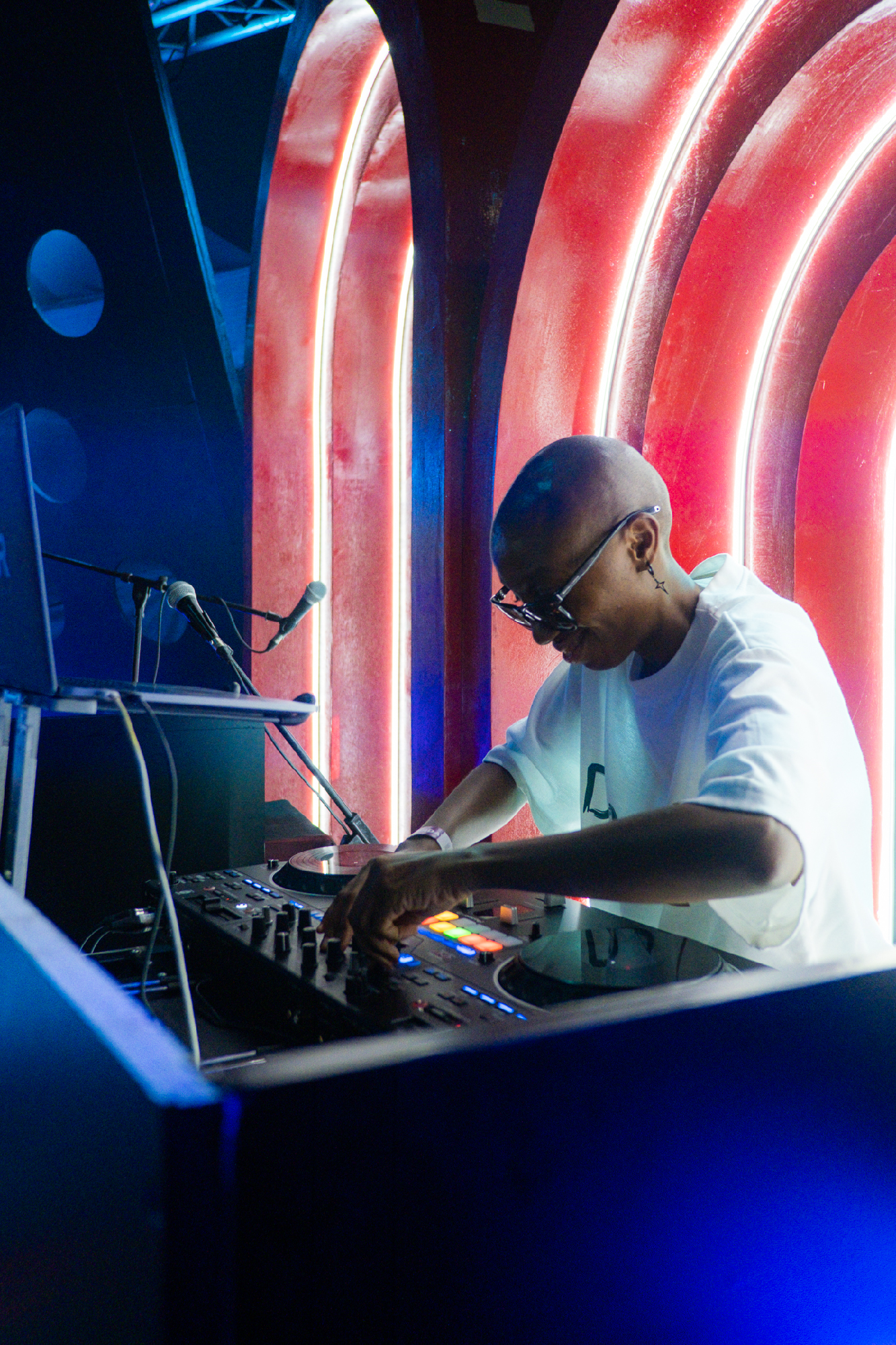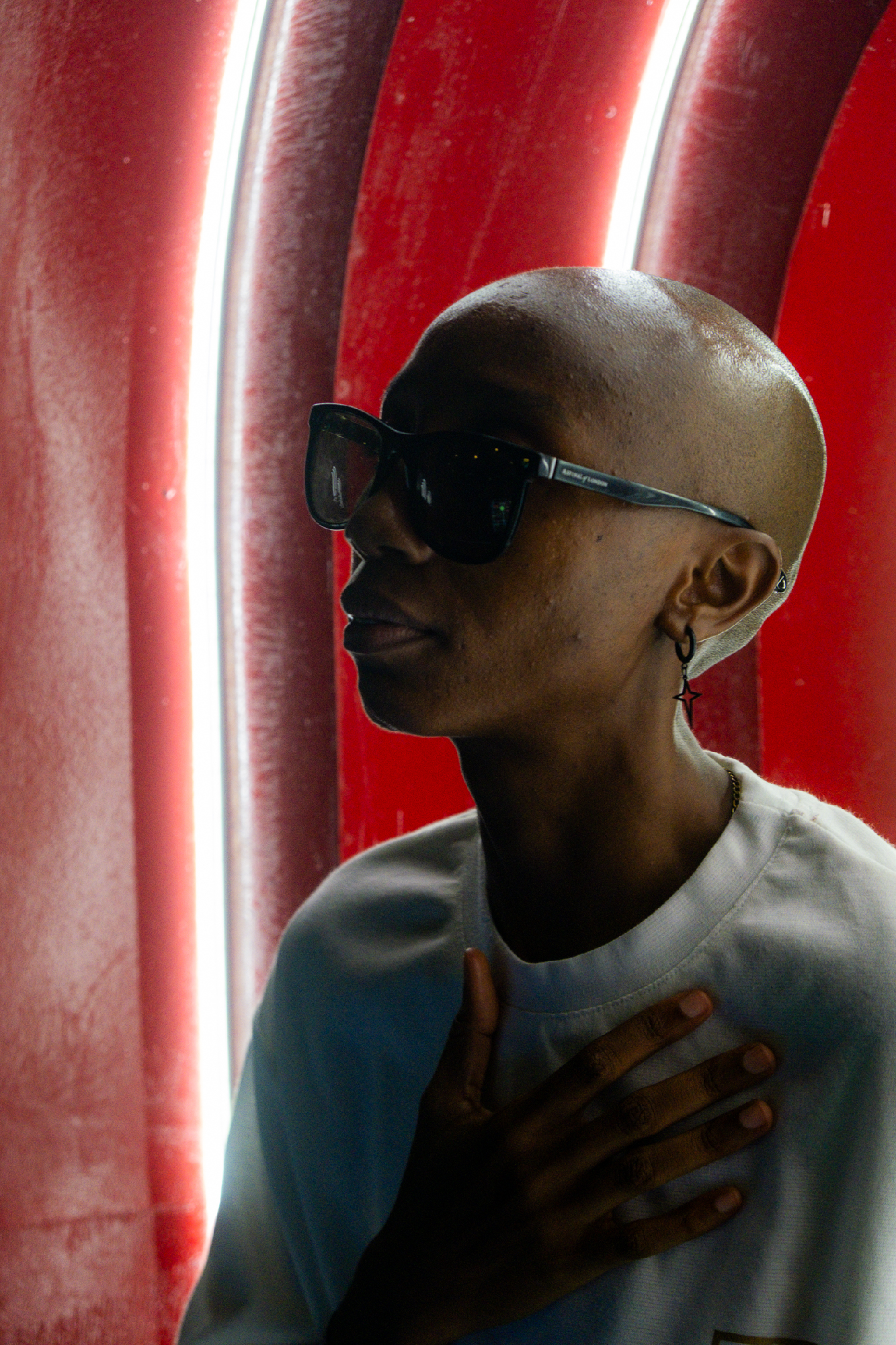As media partner for ART X Lagos, Nataal goes backstage to meet rising DJ star, Dope Caesar
In Lagos, what it means to be a DJ is changing. For the longest time, pure afrobeats has been the name of the game. However, with the penetration of amapiano-only parties, electronic dance communities, and rooftop ravers carving out events for themselves, nightlife is slowly evolving. This is creating space not only for subversive sounds but also for afrobeats to be presented in fresh, innovative ways. In this latter category, we will find Nigerian DJ sensation Dope Caesar whose sets make magic out of seemingly oppositional sounds.
Known off the stage as Sarah Oboh, Dope Caesar was selected for ART X Live!, the music showcase at ART X Lagos. This year’s just-concluded edition of the art fair encouraged deep artistic and cultural exchange, its theme ‘The Dialogue’ inviting creatives to share their diverse experiences and emerge richer as a community. Alongside the fair’s robust display of artworks, films and multimedia installations, ART X Live! presented Dope alongside London-based multi-genre singer Azekel and R&B-fusion star Tay Iwar. This show rounds off a year that has seen Dope’s meteoric ascension. From her sets at the cult party collective Obi’s House, to her viral mix of Brick & Lace’s ‘Love is Wicked’ and Victony’s ‘Soweto’, to her recently released debut single ‘Pop Sermon’ featuring Fave and Ajebo Hustlers, Dope is fast-becoming a star performer.
Before her electric set closing out ART X Live!, where she shut down the venue with a crowd-pleasing mix of everything from R&B to afropop, Nataal sat down with her to discuss all things Dope, DJing, and African art.
This is your first time performing at the biggest art fair in West Africa. What can we expect?
I'm feeling very grateful and blessed for such a platform. It's amazing. I deserve it, but at the same time, you still have to be grateful for it. The set is going to represent afrobeats. The songs are hand-picked and I’m giving you the Lagos vibe.
Right now, seeing a viral Dope Caesar mix on your timeline is commonplace, as well as hearing your music on the radio or at the club. How does the newfound fame feel for you?
I'm still living my normal life. I still walk down the streets of my estate. I still fight drivers in Lagos. [laughs] But it's still surreal because at the beginning of the year, I had goals for myself and a trajectory I wanted to be on. And everything has surpassed what I was expecting. I did what was my best at that time, what was true to me, and the rest is out of my control.
A critical moment was your when your ‘Love is Wicked’ and ‘Soweto’ mix went viral. What led up to that night?
I came up with that transition about this time last year. I like to test my ideas so I did it at Obi's House and Obi's reaction was crazy. So, I was preparing for that set that blew up, and I had a different transition I wanted to do but for some weird reason, I couldn't perfect it, so I said, let me just do this one. I told my content guy to record it. I wasn't expecting that reaction. It was so crazy that, as soon as I spinned back, I said, “I don’t know what to play again. I’m done.” Now I just wake up every day and see a new blog carrying the video.
Let’s take it back for a moment. How did your DJ journey begin?
In 2017 I went to my dad's room, saw a controller and I decided to explore. It was a long journey because I was whack as fuck. [Laughs] But thank God for YouTube. I discovered DJ Puffy from Barbados and was like, “Whoa, that's how he DJs?” I needed to be creative like that. So, I just kept doing it and I fell in love with that style. But it wasn’t until last year that I really took up DJing as a career. I started going out more and meeting people. I started playing for people and understanding how it actually works. Normally, I like to listen to Jon Bellion, Billie Eilish, Demi Lovato and the likes. Alternative music is my thing. But I can't play with that. So I learned how to use my style on the music that people receive outside.
You play for an afrobeats-centric crowd while maintaining a high level of genre diversity. How do you strike that balance?
I play music based on how I feel about the sound. I'm not a spiritual person, but I like to work in frequencies. So how I feel is what I try to put out there. When it comes, I know it's a spirit. Music actually moves, so music that can make you dance can kind of also make you cry. It just depends on the setting. So that's what I really work with to find that balance. Still, there are a lot of things that I can’t do yet because I’m playing for a mainstream crowd. I’m just waiting for the right time when everything comes together. When I do my own headline show, you guys will see.
Who are your five biggest DJ inspirations right now?
DJ Puffy’s number one. He followed me on Instagram and I almost lost my mind! Then Moody Mike from France. And Lebza the Villain from South Africa. Then I like James Hype. As for afrobeats DJs, I would say DJ Shawn.
“Art allows you to express yourself in the best way you can. I’m happy to experience all of this and play my own role too”
In Nigeria we’re getting to the point where DJs are being understood as performers in their own right. What do you think about the current evolution we're in?
Hip hop DJs in the 70s, 80s, and 90s were more performative in what they did. Now we’re seeing it play out here. Like Uncle Waffles. She's a performative DJ and she brings the music to life. I feel like it's a win for DJs. I see a lot of DJs making their own records, publishing their own remixes, playing special stuff. It's not even just the music anymore. It's how you present the music. That's our selling point.
You’ve recently dropped your debut single ‘Pop Sermon’ with Fave and Ajebo Hustlers. What influenced you to start releasing music?
Fave's management gave me that morale. He [Soft] was like, “Just drop it. Just let it go. Don't stress.” It just changed my mentality. I was like, “Omo, drop it. Nothing dey there. Either they like it or they don't like it - we move.” Fave recorded the song when she had already finished her EP but feIt like somehow, people needed to hear it. So, I just took it up and made some finishing touches.
What connection do you see between your work and the African art world?
I had a conversation with Lanre [Masha, ART X Live! curator] the other day and he said, “Art is the first step into culture.” That’s how I see it. All expressions - visual and nonvisual - are so inspirational that they can speak to people, which people can then turn into lyrics and then you get into another kind of art, which is music. And then you get me to spin that at an event. Then you have somebody else using their body to dance, which can then inspire somebody else paint a dancer. It’s just a cycle. Everybody has a role to play. You’ll always have that maze. That's how I see it. Right now, I’m just doing my piece to inspire someone else to do the next big thing and tell a big story about something. Art just allows you to express yourself in the best way you can. I’m very happy to experience all of this and play my own role too.
What’s the importance of multidisciplinary collaboration, and how do you think it can help strengthen the African art scene as a whole?
Well, it's very important because there's strength in unity. When people come together with different forces, it's easier to move something really big than when you're trying to move it alone. It doesn't matter whether it's music or whether it's visual arts. When we merge together, we can always see that, “Oh, this person can be a huge help to my problem and help me.”



